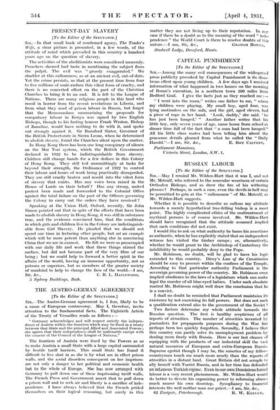PRESENT-DAY SLAVERY
[To the Editor of the SPECTATOR.] SIR,—In that small book of condensed agony, The Trader's Wife, a clear picture is presented, in a few words, of the attitude of mind which prevailed in this country a hundred years ago on the question of slavery.
The activities of the abolitionists were considered unseemly. Preachers showed bad taste in mentioning the subject from the pulpit. The evil was " grossly exaggerated." We shudder at this callousness, as at an ancient evil, out-of-date. Yet the crime persists, so that at the present time from four to five millions of souls endure this vilest form of cruelty, and there is no concerted effort on the part of the Christian Churches to bring it to an end. It is left to the League of Nations. There are many religious people in this land who recoil in horror from the recent revelations in Liberia, and from what they read of prison labour in Russia, but forget that the Memorandum summarizing the proposals for compulsory labour in Kenya was signed by two English Bishops, though to his lasting honour Frank Weston, Bishop of Zanzibar, would have nothing to do with it, and spoke out strongly against it. Sir Ransford Slater, Governor of the British Protectorate in Sierra Leone, when he determined to abolish slavery, found the Churches silent upon the matter.
In Hong Kong there has been one long conspiracy of silence on the Mui Tsai system, which the British Government declared in 1922 to be indistinguishable from slavery. Children still change hands for a few dollars in this Colony of Hong Kong. They still toil unremittingly at tasks far beyond their strength, the Ordinance of 1922 to control their labour and hours of work being practically disregarded. They are still cruelly beaten and resold into the vilest form of slavery that exists. Has any voice been raised in the House of Lords on their behalf ? Has any strong, united protest been made and forwarded to the Colonial Office against the total failure on the part of the Officers governing the Colony to carry out the orders they have received ?
Speaking at the Union Hall, Oxford, recently, Sir John Simon pointed out that in spite of the efforts that have been made to abolish slavery in Hong Kong, it was still in substance true, and the evidence convinced him, that the conditions in which girls and children live in the Colony are indistinguish- able from Girl Slavery. He pleaded that we should not spend our time in lecturing other people, but set an example which will be more potent than anything else in convincing China that we are in earnest. He felt we were so preoccupied with our daily life and work that these things stirred the surface, but did not become part of the very fibre of our being ; but we could help to forward a better spirit in the affairs of the world, having an immense opportunity, not as patrons or superiors, but as members of the greater society of mankind to help to change the face of the world.—I am,








































 Previous page
Previous page